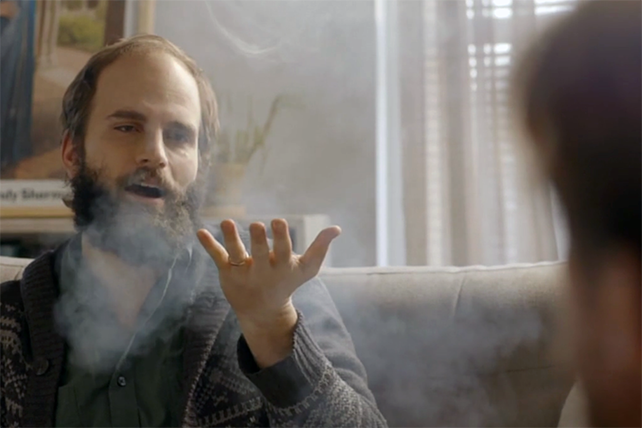If you’ve skimmed through any entertainment or film-oriented site between early November and now, you’ve probably seen that brand new episodes of the critically adored High Maintenance are now available exclusively through Vimeo.
The series, born on Tumblr and featured through Vimeo’s prestigious staff picks, is now Vimeo’s first original series. At $1.99 per episode, you can watch Brooklynites stress while waiting for their weed dealer to arrive whenever you’d like. The acclaimed anthology web series has been available to Internet users since 2012, but since partnering with Vimeo earlier this year, the series has drastically changed the landscape and discourse surrounding independent production, which reaffirms the blurring of web and television content.
The comedy series follows “The Guy” (played by co-creator Ben Sinclair), a dutiful public servant who bikes around Brooklyn neighbs at the beck and call of anyone who wants to get high. Each episode is a one-off story about the human experience within the most mammoth of metropolises — one that’s really just a small town at heart. The only connection between these Brooklynites? The Guy: their local, friendly weed dealer.
The latest cycle of episodes aren’t just the series’ best, they have also ignited conversation about web series content in general. High production value and a homegrown fan base makes High Maintenance and series like it increasingly hard to categorize: is it a series, a series of short films, or meant to be on television?
We had the opportunity to weigh in on the state of the industry and where it’s headed with some of the frontrunners of the wild west of web series. After the first batch of new episodes premiered, High Maintenance‘s husband and wife creative duo, Katja Blichfeld and Ben Sinclair discussed why they chose to go with Vimeo for their new episodes. We also got to chat with Alexandra Roxo and Natalia Leite, creators of acclaimed web series Be Here Nowish. Last but not least, we spoke with Jennifer Danielson of Above Average, Broadway Video’s digital arm, who also weighed in on what’s happening in the digital realm from a curation and production point of view.
After talking with these industry innovators, it’s clear there are five key things web series are doing differently from TV, including why content is resonating so powerfully with online audiences, and what it means for the future of television distribution.
Production values have skyrocketed (but budgets haven't).

Aside from Video Game High School, whose team has the luxury (and anomaly) of working with million-dollar capita, most web series creators have limited financial resources throughout the production process. Many, Be Here Nowish included, are funded through Kickstarter and, if they’re lucky enough to meet their fundraising goal, they can get at least one season under their belt. Yet watching series like Be Here Nowish and High Maintenance, you would never know these folks were strapped for cash.
Remember the early days of web series? The Guild‘s first season or Derrick Comedy’s first batch of videos? It’s certainly safe to say the dog days are over as these latest series are giving us TV-quality shorts at a fraction of a TV production budget. “You already have these series at television quality, so it’s seamless to the viewer,” explains Jennifer Danielson, head of content at Above Average, the digital offshoot of Broadway Video (the same company behind SNL, The Tonight Show Starring Jimmy Fallon, 30 Rock, and more). Above Average, a small multi-channel network that scouts web talent for their own as well as produces original, in-house content including the popular Seriously Distracted, 7 Minutes in Heaven, and more. They already have two web series buns a-cookin’ in the television oven after Comedy Central wanted a piece of the action. Danielson couldn’t disclose which Above Average originals got picked up, but she did give some insight as to why this web-to-television process is beneficial to everyone involved. “It’s an inexpensive, more utilitarian way of putting together a pilot presentation,” she says, “I think it’s much easier to sell into the buying community when there’s something to look at.”
Bringing awareness to monetization issues.
Visit the Be Here Nowish site.
Which brings up to our next point: getting what you pay for. Be Here Nowish, created by Alexandra Roxo and Natalia Leite, Kickstarted their first season and are patiently waiting for a promising partner in getting the ball rolling for their second.
The NSFW Girls and Broad City hybrid is not only laugh-out-loud funny; it’s also startlingly perceptive of what life is like for young New Yorkers who feel the Big Apple just isn’t getting them right now. The hyper-observant Roxo and Leite have taken an elevator pitch-concept — two friends, Sam (Roxo) and Nina (Leite), are sick of New York and go on a trip to LA — and turned it into a narrative of self-discovery, sexuality, and fearing becoming someone they aren’t.
“The key part is monotizing,” says the duo. Not having immediate backing for a second season is difficult, but the plus side is having that calling card Danielson mentions earlier — in this case a phenomenal first season — to show production companies what they have to work with. “They know exactly how their money is being spent,” Roxo explains. It can’t hurt that the series comes with thousands of built-in fans.
Built-in audiences create word-of-mouth hype.
High Maintenance // Brad Pitts from Janky Clown Productions on Vimeo.
Speaking of strong fan bases: web series loyalists will do all they can to see their new favorite project succeed. If you’ve ever donated to a Kickstarter campaign, you know the giddy feeling that follows months later when you get to stream that first episode you helped make happen.
High Maintenance and Vimeo have received a touch of backlash after it was announced viewers would have to pay for something they used to get for free. Blichfeld and Sinclair have both firmly reiterated that Vimeo gave the duo full autonomy to keep the soul of the series going strong, and, from what we’ve seen, the platform stayed true to their word. Freedom ain’t free. Roxo and Leite back up their fellow filmmakers: “We spend fifteen dollars on a bottle of wine. Two dollars per episode or eight dollars for the season pass is nothing.”
This kind of community support is on par with crowdsourcing resurrections of series, a trendy new television fad that has proven wildly successful and has pleased many Arrested Development and Veronica Mars fans. That audiences on the web are also crowdsourcing what they want and keeping series like High Maintenance going is almost common sense…
Riskier content without the cable label.

…especially when these series are giving us no-holds-barred content. When discussing the new season of High Maintenance, Roxo and Leite had to mention the obvious: “They had a full-on dick shot in that last episode. Not that we were into it personally, but it’s great they got to do that.”
It’s true. The second season’s third episode, titled “Ruth,” features full frontal D and Bs in the unsexiest of situations. Blichfeld and Sinclair might have done this for some fun shock factor, but the point is that they can show full-frontal male nudity without any stipulations or jumping through cable hoops. If the husband and wife team had signed on with a company with much deeper pockets like Comedy Central, that dick shot would not have been possible and marginalized nudity would march on — unless you’re one of the lucky few who has a deal with HBO and Cinemax.
Everyone wants everyone else to succeed.

The folks of High Maintenance held their premiere at Pioneer Works, a renovated warehouse in Red Hook, Brooklyn in the middle of East Jesus nowhere. Still, hundreds of people attended, Six Point brewery sponsored the party, there was a pizza truck parked in the courtyard, and catered Tex-Mex (all vegan friendly, of course). They could have easily had their event at some swanky Manhattan locale, but Brooklyn is the borough that made them famous within the New York City community, and now, the country.
Back in April, at the Tribeca Film Festival N.O.W. event, which featured homegrown web series making waves in the filmmaking community, the vibe was not that of your typical movie premiere but something much more welcoming. Creators were sharing their experiences and giving unpretentious pointers. Numbers were exchanged rather than business cards, and everyone was posing for red carpet pictures as a community rather than separate productions. One hand washes the other when it comes to the web, and word-of-mouth support is key in getting any eyes on the small screen.
Like what you see? Follow Decider on Facebook and Twitter to join the conversation, and sign up for our email newsletters to be the first to know about streaming movies and TV news!
 Fun
Fun Frisky
Frisky Nostalgic
Nostalgic Intense
Intense Adventurous
Adventurous Choked Up
Choked Up Curious
Curious Romantic
Romantic Weird
Weird













